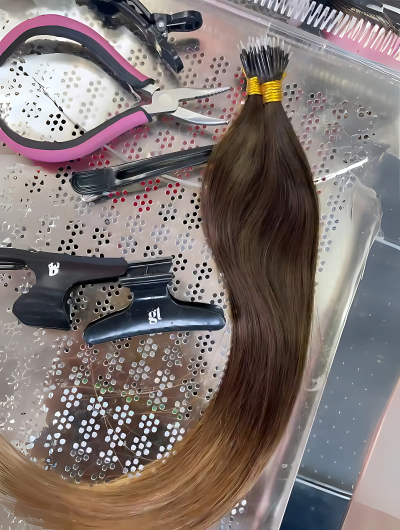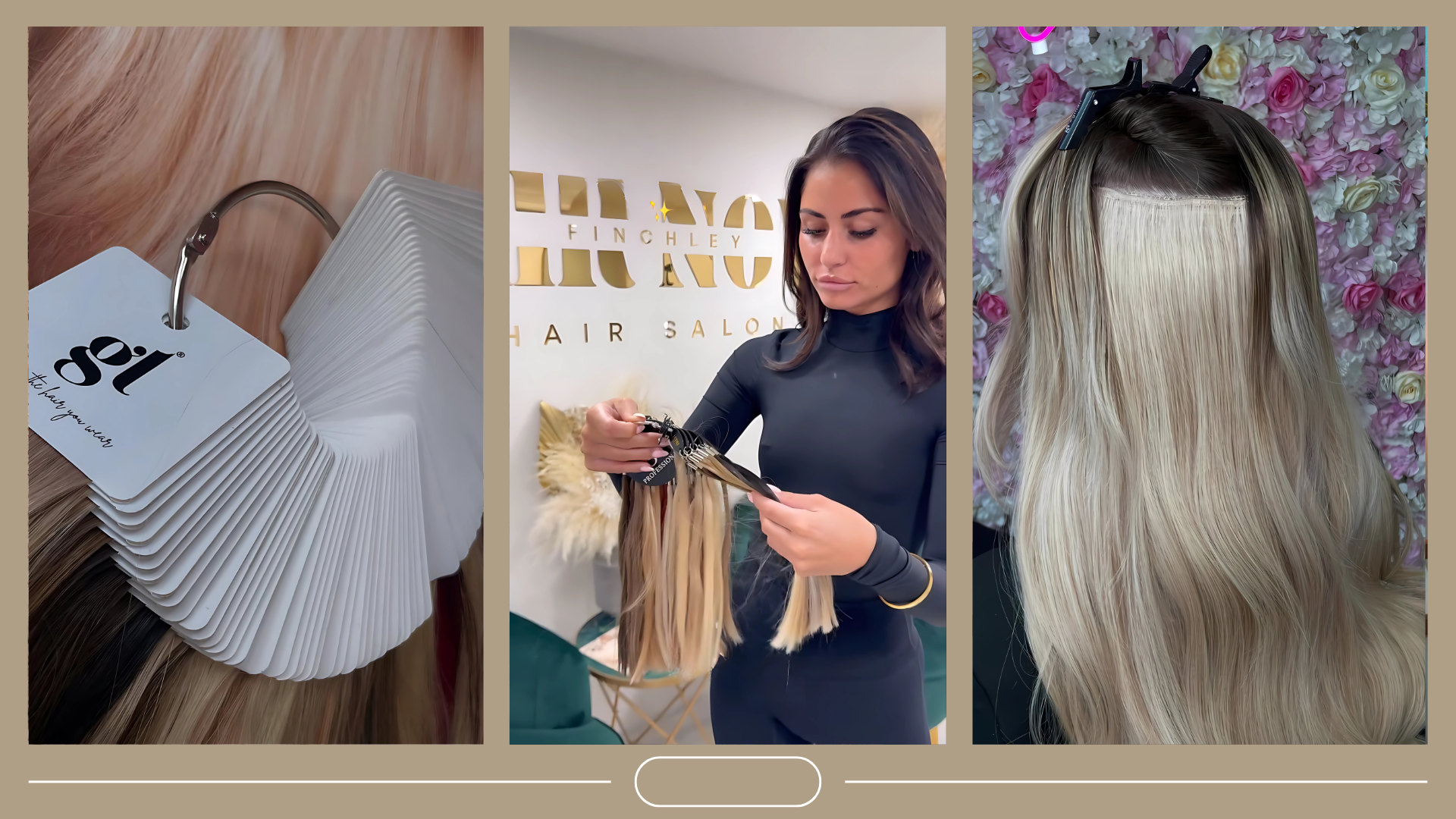The world of hair extensions is booming. Whether you’re a salon owner, a stylist, or someone looking to start your own business, there’s one crucial decision that can make or break your success: choosing a trusted hair extension supplier.
With so many options out there, it’s easy to feel overwhelmed. Some suppliers offer luxury-looking locks at rock-bottom prices, others promise ethically sourced hair without much proof. Whether you’re running a Hair Extension Salon London clients rely on or just starting your own business, choosing the right supplier is crucial. So how do you know who to trust?
Don’t worry — we’ve got you covered. In this guide, we’ll walk you through everything you need to consider before committing to a supplier. From quality checks to customer service, and even those little red flags you might overlook, here’s how to find a hair extension supplier that truly delivers.
Why Choosing the Right Hair Extension Supplier Matters

Before we get into the nitty-gritty, let’s talk about why this decision is so important.
Whether you’re running a hair business or just stocking up for your own personal use, your supplier determines the quality, consistency, and reputation of the products you offer. A trustworthy hair extension supplier will help you:
- Maintain high client satisfaction
- Reduce complaints, returns, and refund requests
- Build a reliable and sustainable business
- Access expert advice and customer support
- Offer a wide range of products that suit different hair types and styles
On the flip side, a dodgy supplier can lead to poor-quality hair, inconsistent batches, or worse — unhappy clients and a damaged reputation.
So let’s get into what you really need to look for.

1. Start with the Hair Quality
First things first — the quality of the hair itself. This is non-negotiable.
Most reputable suppliers will clearly state whether their hair is:
- 100% Remy Human Hair – The cuticle is intact and aligned in the same direction to prevent tangling.
- Virgin Hair – Unprocessed, chemical-free, and often from a single donor.
- Double Drawn – Hair is thick from top to bottom, not straggly or uneven.
Ask the supplier about how their hair is sourced, treated, and graded. If they can’t answer confidently or give vague replies, that’s your cue to walk away.
Top Tip: Ask for samples before placing a large order. A trusted hair extension supplier won’t hesitate to send you small samples to test quality.
2. Check for Ethical and Sustainable Sourcing
These days, customers care just as much about where their hair comes from as how it looks. Ethically sourced hair should be:
- Collected with consent
- Paid for fairly (especially in countries like India, China, and Eastern Europe)
- Free from exploitation
A transparent supplier will tell you exactly how and where their hair is collected. If they claim their hair is “ethically sourced” but offer no proof or policies, take it with a pinch of salt.
3. Dig into Their Product Range
A trustworthy hair extension supplier will offer a wide selection of:
- Hair types: Straight, wavy, curly
- Colours: Natural tones, rooted colours, balayage, bright shades
- Textures: Fine, medium, thick
- Methods: Clip-in, tape-in, nano rings, micro rings, wefts, keratin bonds
The more versatile the product range, the more options you can offer to your clients. Whether you’re offering Hair Extension Services in Finchley or catering to clients online, variety helps meet different hair needs and styles. But it’s not just about variety — consistency is key. You want to ensure the hair quality remains the same across different types and batches.
4. Read Customer Reviews and Testimonials

We’re living in the age of reviews, so use that to your advantage.
Check the supplier’s:
- Google reviews
- Trustpilot ratings
- Social media feedback
- Salon partnerships and endorsements
Pay attention to patterns — do customers complain about slow delivery, tangling hair, or poor customer service? On the flip side, consistent praise is a great sign.
Bonus tip: Don’t just rely on reviews they showcase on their website — those can be cherry-picked. Do a proper search and stalk their tagged posts on Instagram to see real-life results.

5. Ask About Minimum Orders and Wholesale Deals
If you’re buying as a salon or retailer, you’ll want to find out:
- What are the minimum order requirements?
- Do they offer wholesale pricing or discounts for bulk buying?
- Are there starter packs or sample kits available?
A good hair extension supplier will have flexible options — especially if you’re just starting out. They’ll support your growth instead of demanding huge commitments from day one.
6. Evaluate Their Customer Service

This part’s often overlooked, but absolutely essential.
When something goes wrong — and let’s be honest, it might — you’ll want a supplier who’s responsive and helpful. Good signs include:
- A clear contact number and email address
- Live chat or WhatsApp support
- Fast responses (ideally within 24 hours)
- Friendly, knowledgeable staff
Try contacting them with a few basic questions before placing your order. How they respond can tell you a lot.

7. Ask About Delivery Times and Returns
In the hair game, time is money. You can’t afford to wait weeks for your stock to arrive — especially if you’re serving paying clients.
Ask the supplier:
- How long does shipping take (both local and international)?
- Do they offer express options?
- What is their return or exchange policy?
- What happens if the hair is faulty?
A professional hair extension supplier will have a clear returns policy and won’t give you the runaround.
8. Look for Real Education and Support
A supplier that genuinely cares about your success will go beyond just selling you hair. Look for brands that offer:
- Video tutorials
- Fitting guides
- Colour-matching help
- Business tips
- Marketing support
This kind of value-added service can make a huge difference — especially if you’re new to the industry or running a solo venture.
9. Beware of Common Red Flags
Here are a few warning signs to steer clear of:
- Super low prices that seem too good to be true
- No physical address or phone number
- Overly edited product photos
- Poor grammar or broken English on their website
- Refusal to send samples
- No mention of sourcing or ethical practices
- Inconsistent information across platforms
If your gut says something’s off — trust it.
10. Consider UK-Based Suppliers (or At Least Local Distributors)
Buying from a UK-based hair extension supplier can offer peace of mind. You’ll enjoy:
- Faster delivery
- Easier returns
- Better legal protection
- Familiar customer service standards
Even if the hair is originally sourced from abroad (as most is), having a UK distributor who’s accountable can make a big difference.
Choose Quality Over Convenience

At the end of the day, the best hair extension supplier is one that’s transparent, consistent, and committed to quality. Don’t just chase the cheapest deal or prettiest Instagram grid — think long-term.
Building a strong relationship with the right supplier can elevate your brand, win client trust, and save you heaps of stress in the long run.
So take your time. Do your research. Ask questions. And always, always prioritise quality.
Because when your clients love their hair — they’ll keep coming back.

Still Not Sure Where to Start?
Here are a few questions you can ask potential suppliers right away:
- Can I request a sample before placing a full order?
- Is your hair 100% Remy and ethically sourced?
- What’s your delivery time and returns policy?
- Do you offer support for salons or stylists?
- Are there any bulk order discounts available?
The right hair extension supplier will answer confidently — and happily.
Let this be your guide to choosing a supplier you can trust. Great hair starts with great partnerships, and the perfect supplier could be the key to levelling up your brand.
Whether you’re just starting out or looking to upgrade your stock, never settle for less than what your clients — and your business — deserve.
FAQ
How do I know if a hair extension supplier is trustworthy?
Look for transparency in sourcing, consistent customer reviews, clear contact details, and good communication. Reputable suppliers usually provide product samples, offer a returns policy, and are happy to answer your questions. Avoid suppliers that are vague, have no reviews, or seem too cheap to be true.
What type of hair should a good supplier offer?
A reliable hair extension supplier should offer:
- 100% Remy human hair
- Virgin hair options
- A mix of lengths, colours, and textures
- Various fitting methods (clip-in, tape-in, nano & micro rings, wefts, keratin bonds)
Bonus points if they also provide custom orders or colour matching services.
Should I buy from a UK-based hair extension supplier?
Buying from a UK-based supplier can be a smart move if you want faster shipping, easier returns, and reliable customer support. Even if the hair is originally sourced from overseas, working with a local distributor can save you time, stress, and unexpected customs fees.
Is it safe to buy hair extensions online?
Yes — but only if you do your homework. Always research the supplier first, read reviews, ask for samples if possible, and check return policies. Trusted hair extension suppliers will be transparent and have a secure website, detailed product info, and responsive customer service.
Can I return hair extensions if I’m not happy with them?
That depends on the supplier’s return policy. Many allow returns if the hair is unused, unopened, and in original packaging. Always check the fine print before you buy, and avoid any hair extension supplier that doesn’t offer returns at all — it’s usually a red flag.



